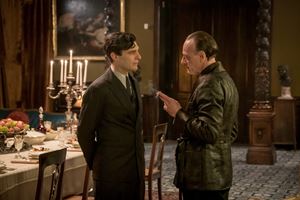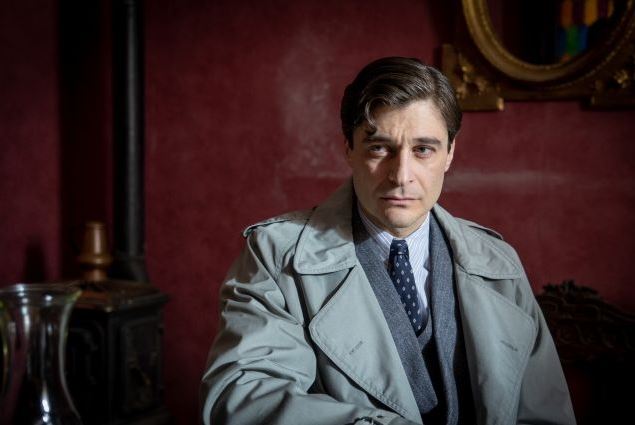In the middle of the journey of the third series, the third and penultimate episode of which will be broadcast on Rai Uno on Tuesday 18 November, ahead of the initial schedule which included four Mondays, we left Commissioner Ricciardi at the exact point of the intersection between the love he is discovering and the pain that grips him, the moment in which he confides his ghosts to his now official girlfriend. It is the moment that perhaps asks of Lino Guanciale, who is now the very effective and official face of the Commissioner coming from the pen of Maurizio De Giovanni, the maximum intensity, even if restrained as is that of this character almost in grisaille.
Guanciale, you have said several times that you would have liked something by Ricciardi, but would you really want to resemble such a tormented and shady character?
«Honestly yes, but not so much for its darkness, not so much for the burden it carries, (the gift/curse of seeing and hearing the last thoughts of the victims of violent death, ed.) who would want that? I would like to resemble him in his ability to remain faithful to a very precise idea of justice, to a very pure idea of relationship with others, very clearly defined and above all faithful to a great empathetic choice towards humanity: Ricciardi lives to make the most of a gift that is also a curse, he chose his job (even if economically he could afford to live on an income – ed.) to leave the world a little better than he found it. And this principle informs his entire life. Well, I would like to have this great coherence, this great courage, this great strength.”

In this third series, which reaches 1933, we feel the regime becoming more oppressive, how does Ricciardi live his times?
«Somehow, accustomed as he is to living immersed in human pain, initially in my opinion he underestimates the abyss into which his country, the whole of Europe, the whole world, is slipping due to the pernicious Nazi-fascist ideological drift, but he is also someone who knows how to look reality in the eye, who knows how to make precise choices and does not give in to being part of that gray area that makes everything go well. He looks a lot like the protagonist of the Plague of Camus, Doctor Rieux, who while the plague rages holds tight to his principle that the important thing is to do one’s job well. Here, for Ricciardi this means never failing in the duty to do justice for others.”
In this sense the three male figures of this series, Ricciardi as the protagonist, Maione and Modo more secluded, correspond to each other: none of the three are aligned, none of the three feel at home in the drift in which they find themselves, despite being profoundly different. How did you understand Ricciardi’s sensitivity in this aspect?
«I was guided by the novels, because I believe that a guiding principle of our profession is to stay with the writing without overshadowing the interpretation with a prejudice or judgment on the characters, without also superimposing our own point of view. I relied on the letter of the novels: there were moments in which perhaps I told myself that I would have tried to act differently than Ricciardi, but there were many others in which I said to myself: “Here, learn!”. In situations of a certain type it would be really important to know how to react like him. The great merit of Maurizio De Giovanni is, in addition to having composed a literary saga of such great and non-random success, that he has sculpted beautiful, profound characters, full of facets and possibilities for the actors and actresses who interpret them: they are all characters who are in some way “broken”, wounded, and find themselves faced with multiple crises to go through. If you stick to the way the character deals with all his transitions, he’s the one who takes you by the hand.”
Does playing a character from that era help you process historical distance?
«Going through those years backwards, from the position of today’s awareness, must help you to clearly identify who made right and wrong choices, without however indulging in easy judgements. Ricciardi, as well as Arturo Ui’s irresistible rise in the theater years ago, gave me the opportunity to immerse myself deeply in the study of that period, which I think we should treat as if it were our present. Let me explain: I don’t believe in the equation today = yesterday, it would be trivializing history and admitting that we must resign ourselves to the fact that the world never changes and instead changes continuously. But there are moments in which people manage to “push” history in the right direction: I think of the Founding Fathers, the first ones who developed the precursors of the European Union. Here, I believe we must be up to it.”
Ricciardi is a character, from a cinematic point of view, very nuanced: he has great depth, all expressed in minute ripples, he generally has no theatrical reactions. This is from the point of view of the actor’s challenge of what he represents?
«It’s much more difficult. This character presented me with the difficulty of firmly adhering to a principle that I share: “less is more”. (English way of saying that alludes to the added value of essentiality, ed.). When you have to act “to take away”, you have the responsibility to take maximum care of that “less” you do, trying to make it as powerful as possible. However, the thing that happens in this season in particular is that with his restraint Ricciardi has moments in which he goes off the rails, and that is truly surprising, because where there is a basic restraint then the transgression is much more powerful, much more recognisable: if you immediately mount an interpretation so built on expressive excess, then everything becomes a continuous alarm, however with a character like Ricciardi the “emergencies” are much more effective and recognisable.”
How does someone who is shy, as he says he is, become an actor?
«I believe that the shy ones are those who in the end manage to do it with greater honesty, in the sense that if you sort out the actors who claim to be shy you will find very many of them: some are shamelessly lying, the others, the majority, actually are, but the point is that the stage is not, as one thinks, a place solely for performance. For many people, for me certainly, it coincides with the only space in which at a certain point one has the electrocution of being able to enter into communication with others: that perfect silence, that perfect communion between actors and actresses on stage and spectators in the audience is an unrepeatable sensation, and when that thing happens there you feel you can be yourself. I know it’s paradoxical, but the stage is not a place where you put on masks, it’s a place where you take them off. And the shy ones are actually those who are just waiting to be able to take a break from a world that forces us to wear masks at every moment of life.”
Now everyone reads Ricciardi by giving him the face of Lino Guanciale. When you imagined it as a reader, did you think of it as you see it now when you see yourself in the series?
«Everyone but me. I have never imagined Ricciardi in a precise way, reading him as a reader, before. Even when they then asked me to interpret him and I had to study the series with great commitment, to immerse myself in this world of his, I still couldn’t imagine it with my own face, because otherwise this thing would have driven me crazy, it would have made me feel the sense of responsibility that I already felt very strongly in having to interpret such a beloved character. You don’t have to think that that character will then carry your raincoat, put your hands in the pocket, that he will have your shoulders, your back, your hair, including your rebellious curl. If you think about it, this thing paralyzes you. When I read the scripts I keep imagining a Ricciardi who doesn’t have very precise features, I just imagine two enormous green eyes into which the whole world sinks. Ricciardi is the most empathetic character in the world, who wears a kind of apparent anti-empathic armor, and he perceives all this enormous humanity through those two wonderful green wells that are the eyes, but if I started to think that the green eyes are mine, who would do it to him?».
Ricciardi runs away, but makes very different women fall in love. How is the different relationship with at least three female figures built in such a restrained character: the friend Bianca, one Livia femme fatale full of fragility, and then Enrica, the reference figure that he peers through the window and in which he seems to be mirrored?
«Enrica and Ricciardi are people for different reasons not aligned with the world in which they live and perhaps not aligned with the world in any era, destined to be uncomfortable with the conventions to which most people conform. With Enrica there is a sort of mutual recognition, this gives an idea of the relationship between the two. It is possible in fact that the window, like a mirror, also represents this. While Livia and Bianca are two important figures in his journey whom Ricciardi approaches for different reasons: Biana for the enormous elective affinity, Livia for the experience of a passionate outburst which for Ricciardi is something new, significant in its evolution. The closer Ricciardi sees himself to these three very different figures, the more he demonstrates to them that they are for different reasons women also bearers of a femininity not aligned with the conventions of the world. Perhaps it is the thing that leads them to be close to a man who evidently conforms to an idea of maleness, of virility, completely alien to the one in force. I believe that the seductive strength of this character lies precisely in the fact that he shuns the male clichés of that era and of all times and that this is where his modernity lies.”


